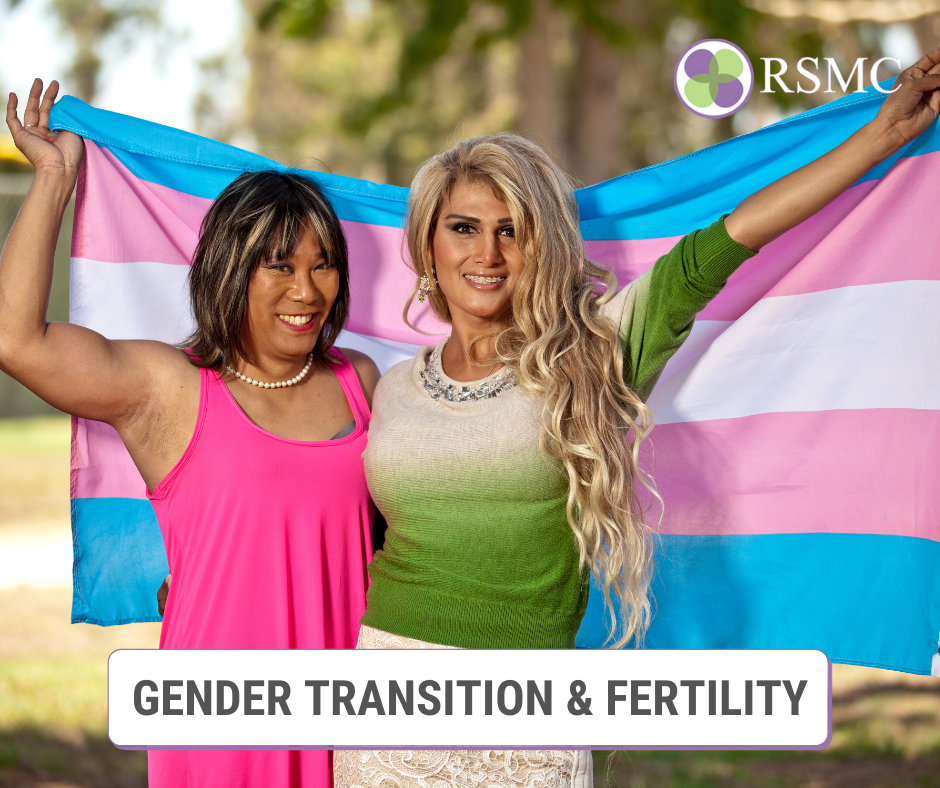The term “transgender man” is used to describe an individual who was assigned a female gender at birth but chooses to identify as a male. Not all trans men undergo medical transition. However, some may opt for hormone therapy to make their secondary sexual characteristics more aligned with the gender they identify with. However, many of these transition therapies also impact the fertility health of transgender men. Hence, by freezing eggs before starting a transition therapy, transgender men can preserve their fertility. This gives them a powerful option to have biological children in the future. As a leading LGBT friendly fertility clinic, RSMC, San Diego has helped many transgender and same-sex couples start their family. In this article, we will see how transition therapies can affect transgender fertility health. We will also discuss how freezing eggs can be helpful.
The egg freezing process for trans men
How does testosterone treatment affect transgender fertility?
Testosterone therapy often leads to amenorrhea (no menstrual periods) and anovulation (no ovulation) in the long term. According to a study, over 90% of transgender men undergoing testosterone therapy stop menstruating within six months.
It’s still possible for transgender men to become pregnant and have healthy children. In a survey of pregnant trans men, 80% of the participants reported that their menstruations returned within six months of stopping testosterone treatment. Hence, it’s important for anyone undergoing testosterone treatment to note that it is not a form of contraception.
The impact of long-term testosterone treatment on fertility is not yet known. According to a 2019 study, ovarian function is still maintained in transgender after one year of hormone therapy, even though the levels of AMH had reduced. However, transgender men undergoing medical transition may have to be on testosterone for the remainder of their lives. And, there’s currently no research that can give us an idea of what occurs after five or more years of using testosterone.
Hence, it’s advisable that trans men who wish to have biological children in the future consider freezing their eggs. That is, before commencing or early in the testosterone hormone therapy.
The egg freezing process for trans men
Ideally, the freezing of eggs would take place before the transgender man begins hormone replacement therapy in order to preserve their fertility. However, the fact is, it doesn’t always occur that way. A 2020 study of egg freezing results indicate that it’s still possible for trans men to have successful fertility preservation treatment, even if they have been using testosterone before.
Testosterone stops the body from maturing and releasing eggs (ovulation). The aim of egg freezing is to mature and retrieve as many eggs as possible. This implies that transgender men will have to quit hormone therapy and start menstruating again before going for egg freezing. It is understandable that this can be a hard thing to do. A trans man may experience a reversal of the testosterone-induced masculinizing process once they go off testosterone.
As an LGBT friendly fertility clinic in San Diego, we advise transgender men to have adequate mental health support when going through the egg freezing process. Remember, there are mild side effects of egg freezing. To name a few, breast tenderness, bloating, and so on. These can be emotionally trying or uncomfortable for someone who may also be experiencing gender dysphoria.
Other than these considerations, the egg freezing process for transgender men is not different from that of other patients. For 8 to 12 days, starting the second day of the monthly period, the patients are going to inject themselves with ovarian stimulation medications. The function of these medications is to encourage the ovaries to produce several eggs. Once the eggs have matured, they will be collected from the ovaries through an outpatient surgical procedure known as the egg retrieval. The retrieved eggs will then undergo cryopreservation in the lab. These frozen eggs can be stored for many years.
How Transgender men can utilize their frozen eggs to preserve their fertility
Egg freezing offers transgender men a lot of options to build a family. It safeguards the frozen eggs from damage that can result from gender-confirming hormone therapy. Freezing eggs provides transgender men with plenty of family-building options in the future.
As we have mentioned earlier, Transgender men can still carry pregnancies. Moreover, they can use their own eggs to create a baby through IVF. Research has shown that testosterone can affect a developing fetus. Hence, it’s best that trans men stop testosterone therapy before and during their pregnancies.
Some trans men may not want to carry a pregnancy. Some may even choose to have a hysterectomy (surgery used to remove the womb) as a part of their transition. After freezing the eggs, a Transgender man can use a surrogate to help them carry and give birth to their biological child. Reciprocal IVF is another great family building option for trans men whose spouses have uteruses. During this procedure, the egg of one partner is fertilized with donor sperm and transferred into the other partner’s womb. This enables both partners to actively participate in the biological process of conceiving a baby.
For transgender men who may want to use a gestational surrogate in the future, there is one more step to take. Screening required by the Food and Drug Administration (FDA) that includes HIV, hepatitis, and STI testing. The screening has to take place before the egg freezing process.
Does insurance cover the costs of freezing eggs for Transgender men?
A lot of US employers and insurance providers don’t cover fertility preservation options, such as egg freezing, for transgender men. In a study on employee benefits, just 3% of those who responded said that their employers offer coverage for egg freezing costs. However, you need to consult your insurance provider to understand your coverage. This will also help your employers to know if they work with any third-party fertility benefits companies. It’s also important to keep in mind that, even in cases where there’s no coverage for the egg freezing procedure, the fertility medications may be covered. At our fertility clinic in San Diego, a financial counselor will assist you to figure these things out.
Fortunately, we are beginning to see huge changes in insurance fertility coverage. For instance, New York has enacted a law that will require that insurance providers cover IVF (in vitro fertilization) and “medically necessary” egg freezing (i.g. before cancer treatment). And these benefits will be accessible to all patients, regardless of their relationship status, gender identity, or sexual orientation. Although it is not clear right now, we hope that the “medically necessary” category will include members of the transgender community.
Conclusion
Egg freezing has brought a viable solution for transgender men to preserve their fertility and start a family even after the transition. As a leading LGBT fertility clinic, RSMC believes everyone deserves to build a family irrespective of their gender.
Do you want to learn how we can help you with egg freezing and transgender fertility? Want to know how other LGBT family building options such as IVF, IUI, and surrogacy can be helpful? Schedule a consultation today with our LGBT friendly fertility clinic in San Diego. You can also visit our website to have a chat with our team.

























